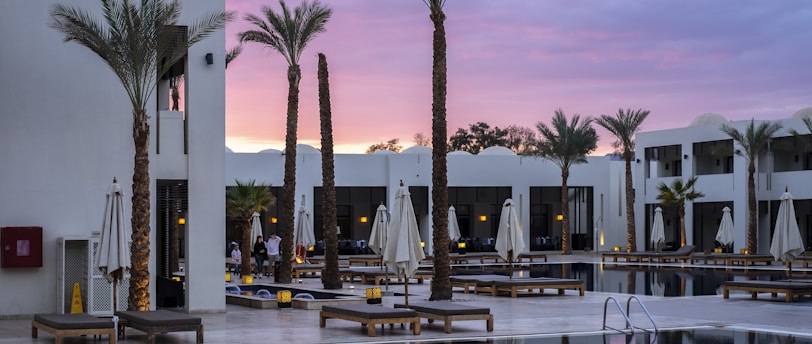How To Choose Safe Accommodations When Traveling
Discover essential tips for choosing safe accommodations while traveling. From researching neighborhoods to evaluating security features, this guide offers practical advice to ensure your safety on the road. Learn how to read reviews, trust your instincts, and prepare for emergencies, making your travel experience both enjoyable and secure.
The Traveled for You Team
11/11/20244 min read


How to Choose Safe Accommodations When Traveling
While traveling is among the most fantastic things in life, taking care of your safety on the road counts most. Among many essential features of travel safety, picking up appropriate accommodations is among the most critical tasks. With so many various options available, sometimes it may be quite challenging to decide where you should stay. The following step-by-step guide will help you with the selection of safe accommodations for your trip and how to make sure it will be enjoyable as well as secure.
1. Research the Area
Understand the Destination
Orient yourself to a destination before you make any accommodation booking. Do some research on the neighborhood in which your prospective lodging is situated. Are recent safety reports available? Check your government's travel advisory site, and look to resources such as travel forums, blogs and social media to get information from fellow travelers.
Look for Safety Ratings
Neighborhood safety ratings are provided by many travel websites and applications. Websites like TripAdvisor or Yelp, sometimes review the safety of a neighborhood. Look for comments about crime rates, incidents that have happened locally, and overall feelings of safety from previous guests.
2. Choose the Right Type of Accommodation
Hotels vs. Rentals
This probably has to do with the fact that hotels generally have better security than private rentals. Consider exactly how much security you are requiring. Hotels typically have a front desk open at all hours, cameras, and secured guest room access.
On the other hand, vacation rentals can be more homelike; however, this is where one ensures that the property is situated within a secure neighborhood. Websites like Airbnb and Vrbo offer user reviews, which can give an idea concerning safety.
Consider Hostels with Caution
While hostels are a cheaper way of accommodation, they also imply shared rooms that aren't that safe. In case you are forced to stay in hostels, find those with lockers and great reviews for safety and cleanliness.
3. Check Security Features
Look for Secure Access
When booking a place to stay, opt for those that offer some form of security in the access: key card systems, electronic locks, or at least staff monitoring entry points. Avoid those places using traditional keys, as these are most easily duplicated.
Evaluate Room Security
Check whether rooms are equipped with deadbolt locks, peepholes, and lockable windows. If staying in a private rental, ask about security features before arrival.
4. Read Reviews and Ratings
Safety Concerns Filter
When reading through reviews, notice that many travelers mention how safe or not they felt during their stay. Make use of the filters on travel websites to show only the reviews regarding safety.
Note Recent Reviews
Always read the latest reviews since those will give you an idea of the current situation concerning accommodation. It could be that in one place there were some issues previously, which by now could already have been resolved, or it might face some new problems.
5. Contact the Accommodation Directly
Enquire About Safety Features
Don't be afraid to get in contact directly with your accommodation provider. Inquire about the venue's security features, the numbers of staff that will be there, their security personnel, and how they would deal with a sudden emergency. A good establishment will be ready to share all this information with you.
Get Clear on Cancellation Policies
Safety also includes having contingency plans. Before you book, take the time to know the policies on cancellations. When you arrive and feel that you are not safe, knowing your options can help you make a quick exit.
6. Trust Your Instincts
Trust your instincts
When you arrive at your accommodation, take a good look around. If something feels off, whether it be the vibe of the street, the cleanliness of the house, or the mannerisms of the staff, trust your instincts. It is always better to be safe than sorry.
Take Note of Your Environment
Take in the scene outside of where you are staying: Are there plenty of streetlights? Are people around? Look for evidence of a well-cared-for neighborhood, as that is often indicative of safety.
7. Consider Proximity to Emergency Services
Find Nearby Facilities
Before you get your final accommodation, know which ones have the nearest hospitals, police stations, and fire departments. This somehow gives peace of mind and might be really helpful during an emergency.
Assess Means of Transport
Your safety might also concern how you are going to get your transportation. Look for rentals near public transportation or highways for easy movement in and out of the place, and for your exit from the place if needed.
8. Safety in Numbers
Travel Alone vs. Group
If you are traveling alone, be sure to book accommodation that is popular with other solo travelers or stays in more touristy areas. This can give you an added layer of safety, as well as create some opportunities for you to meet others traveling.
Let someone know your plan
Always let a friend or family member know where you will be staying and how you plan on traveling. In this way, if an emergency does occur, someone will know exactly where to look for you.
9. Prepare for Arrival
Plan Your Arrival Time
Try to arrive in daylight hours when you will be able to see the surroundings more clearly. Should you be arriving in the dark, consider your options for an airport pickup or a reputable taxi or rideshare service.
Know Your Layout
Upon arrival, take a few minutes to become familiar with the accommodation layout: where exits are, what emergency procedures are followed, how to contact staff if the need arises.
10. Stay Vigilant
Attention and Awareness
When you are there, be very attentive to what is going on around you. Avoid distractions such as excessive use of your phone while you are in open areas. Being more aware will help you in observing a threat before it escalates.
Secure Your Belongings
Keep your belongings secure. Use hotel safes or lockers in private rentals. Limit what you carry with you when exploring, taking only what is necessary and leaving the rest of your valuables behind you.
Conclusion
Accommodations on trips are a crucial deal in making or breaking the case of having a pleasant and safe experience. You can minimize risks by first researching the destination, types of available accommodations, reading reviews, and trusting your instincts.
But safety is one thing, it mustn't be allowed to rob the fun of traveling. And with proper preparation and necessary precautions, one can enjoy the adventures and feel secure about his surroundings at the same time. So pack your bags, stay tuned, and set off on your next journey with confidence!
Inspiring travel stories and practical tips await you.
Wanderlust
Adventure
contact@traveledforyou.com
© 2024. All rights reserved.
